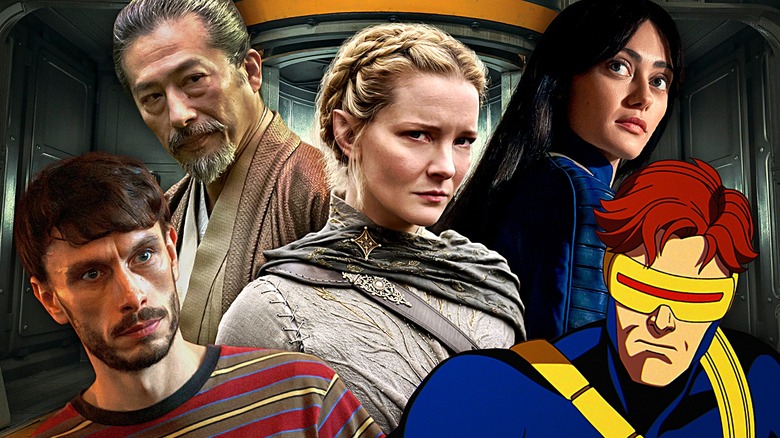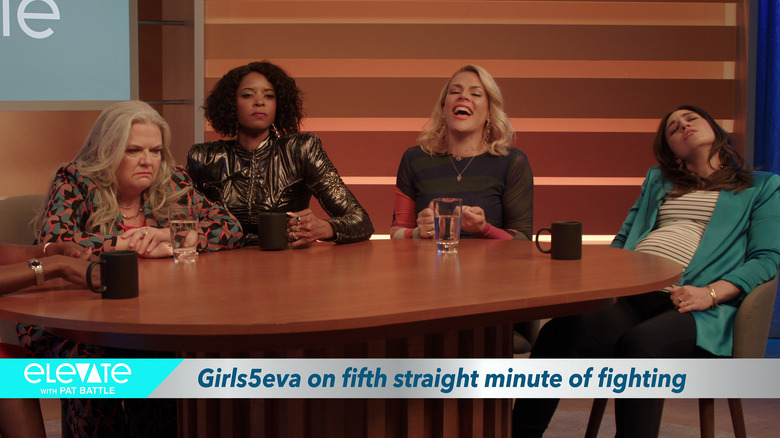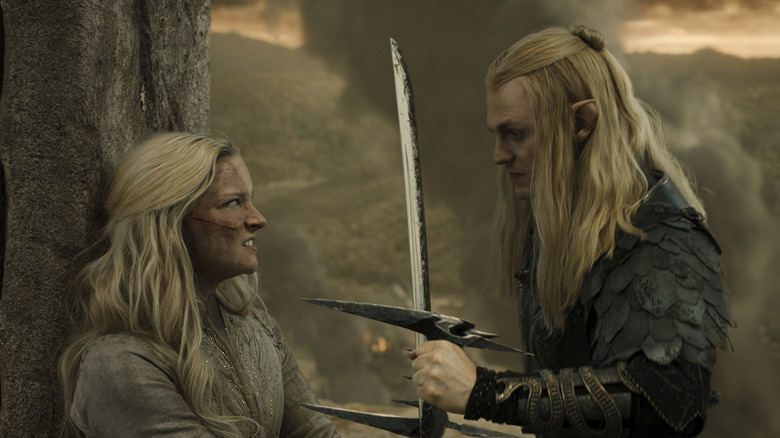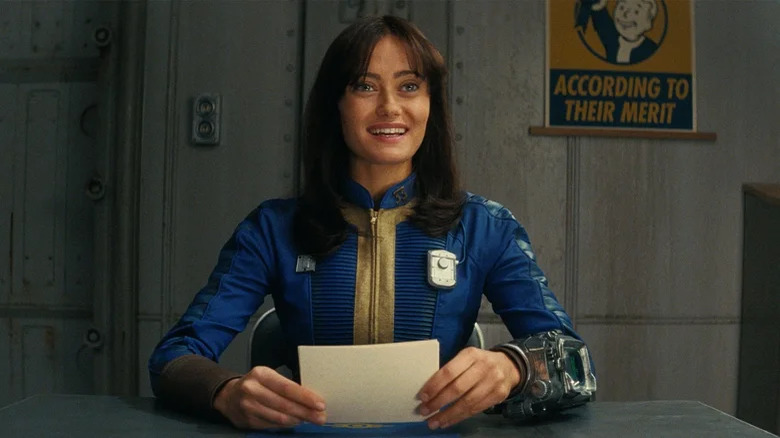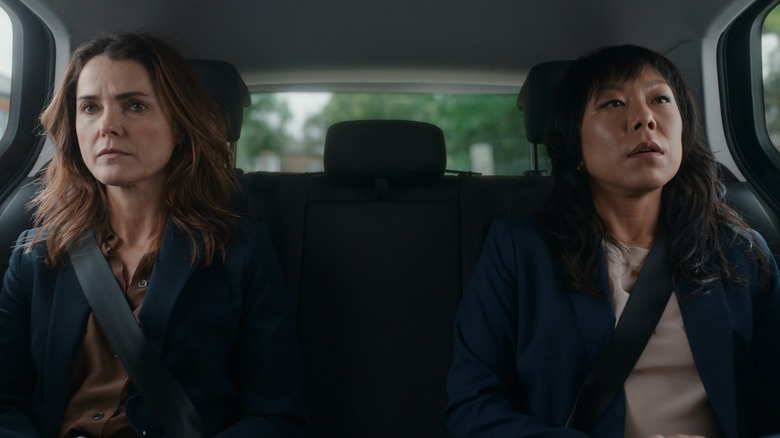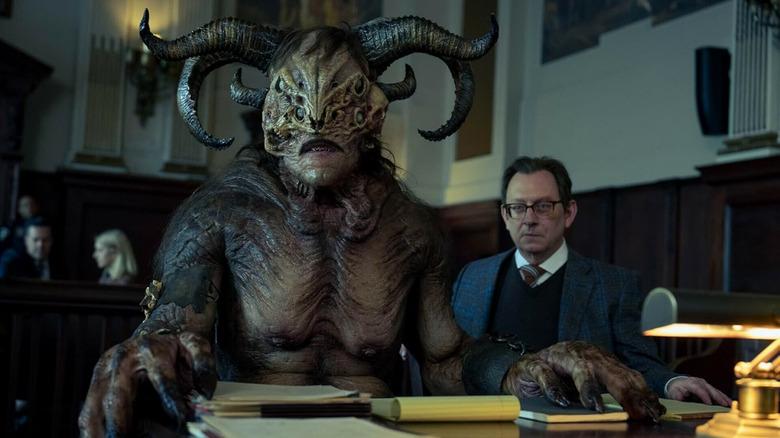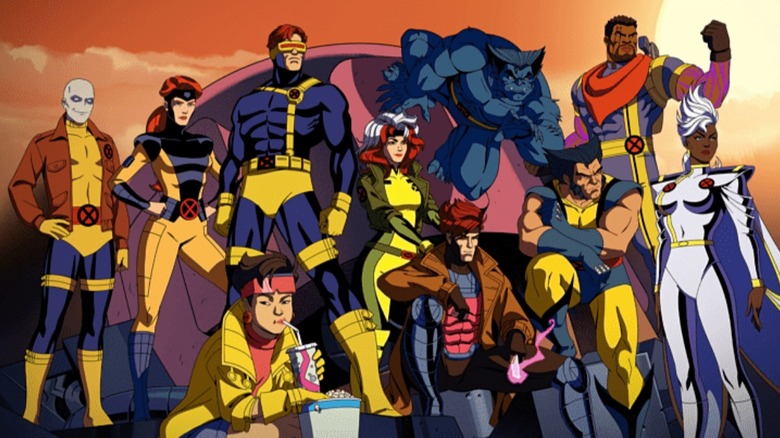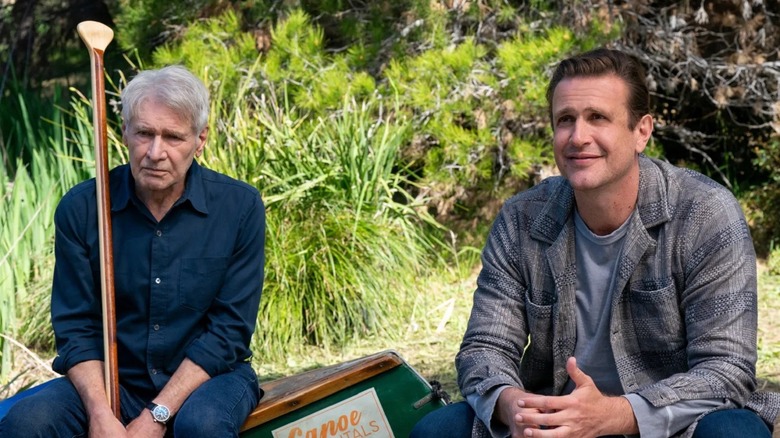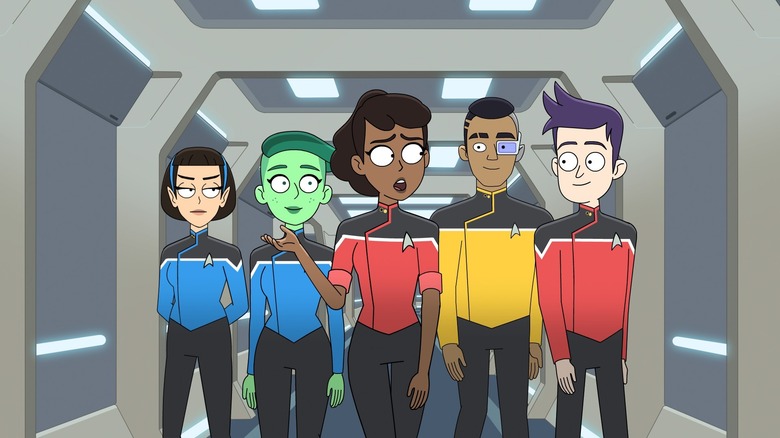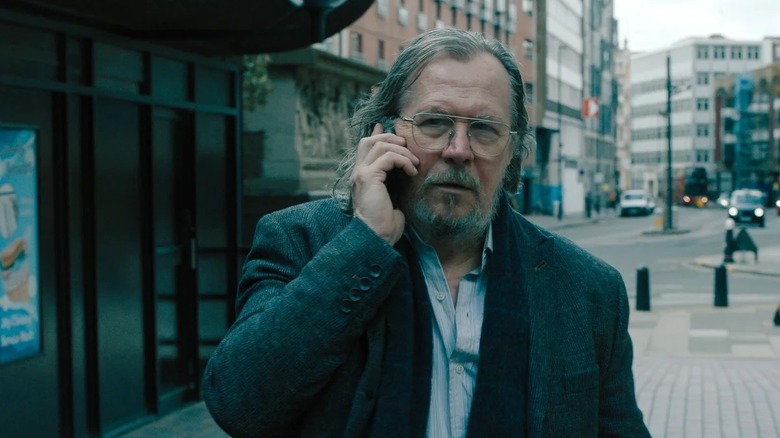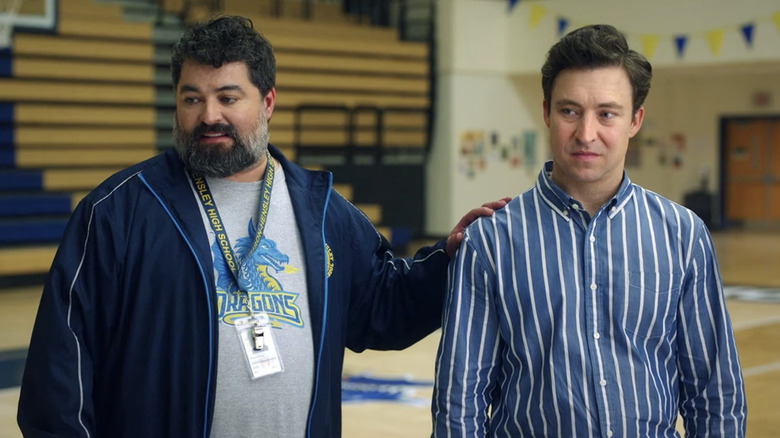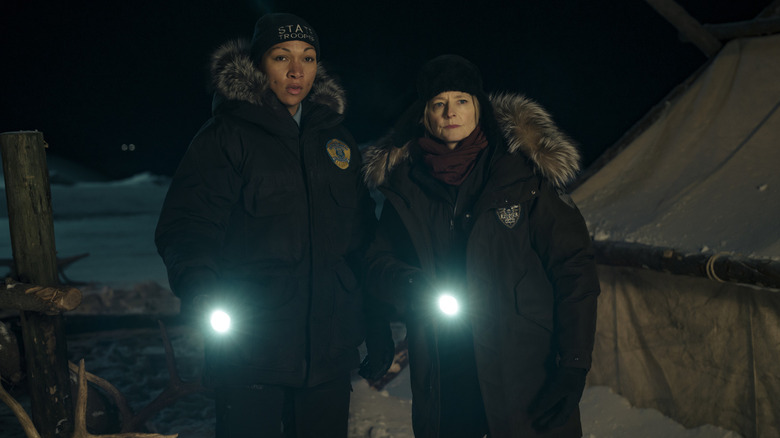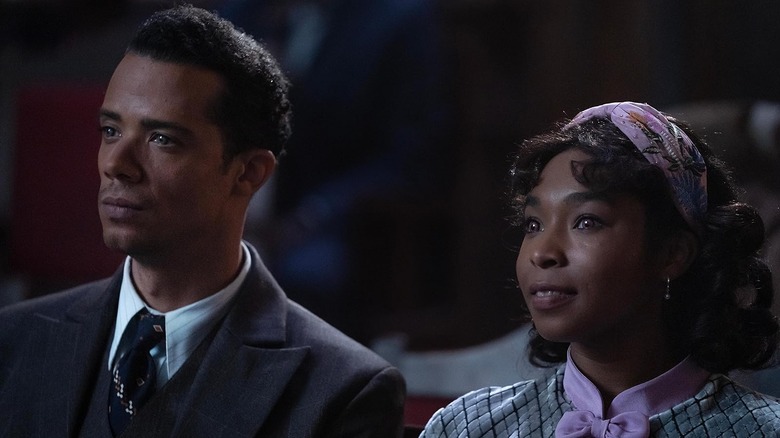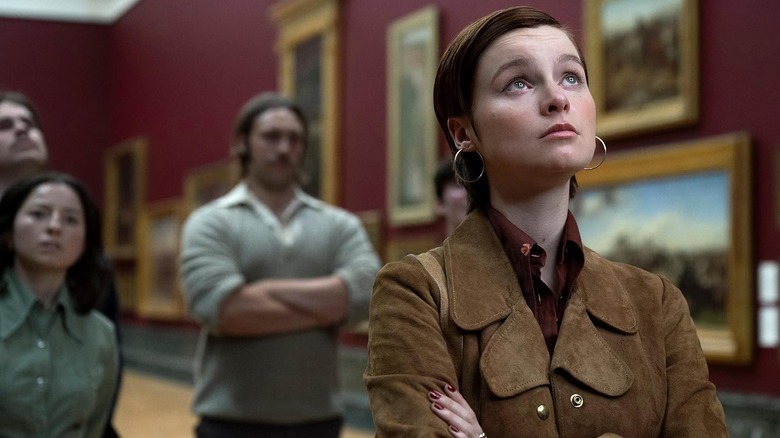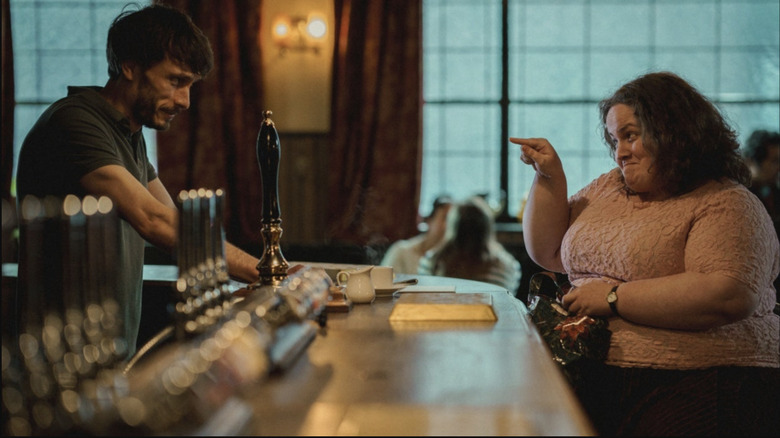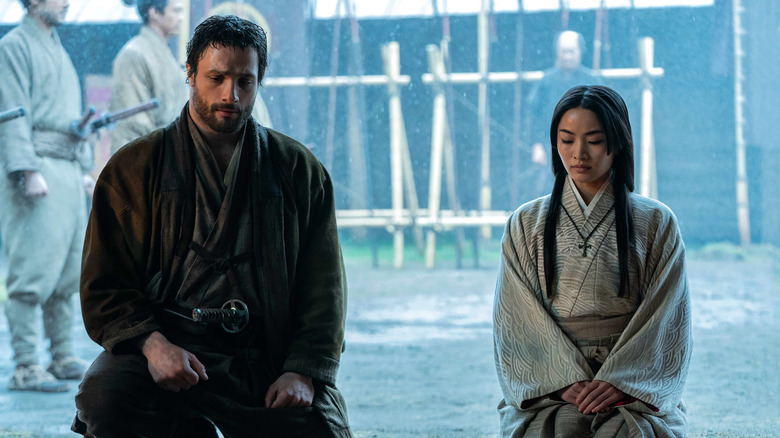The 15 Best TV Shows Of 2024, Ranked
We may receive a commission on purchases made from links.
How should we face the future that's to come? If the TV shows that moved us in 2024 are any indication, the answer involves collective action, the preservation of hope and anger, and — as shows like "Evil" and "English Teacher" effortlessly remind us — the ability to laugh in the face of the absurd. It seems likely that the creators making our favorite shows didn't foresee some of this year's most dystopic global and national events, but their art speaks to a world in unprecedented chaos nonetheless. Whether you're more into the stalwart mottos of Starfleet, the unspoken camaraderie between the vulnerable women of Ennis, Alaska, or the "okey-dokey" attitude of Vault 33's best and brightest, the best television of 2024 offered a number of stirring solutions to the question we're all anxious to ask: how the hell do we get through this?
World events aside, TV was also just pretty great this year. Much was understandably made of the industry contraction expected in the wake of the COVID-19 pandemic and last year's Hollywood labor battles, but for now, there's still more TV worth watching than any one person has time for. The best shows of the year offered phenomenal performances, cinematic visuals, creative twists, challenging questions, sharp humor, and a level of small-screen artistry that doesn't feel small at all. When we lament the lack of good TV available these days, it seems clearer than ever that we're really just lamenting the time it takes to suss out all the good stuff in the streaming era. That's a legitimate problem, and we're doing our part to fix it with this list of the 15 best shows of 2024, as chosen by our TV-loving staff. Sit back and relax: /Film's got your next binge-watch covered.
15. Girls5Eva
You're living your life wrong if you're not up to date on "Girls5Eva." Meredith Scardino's fast-paced story of four pop girlies reuniting as a band in their 40s (produced by Scardino's former "Unbreakable Kimmy Schmidt" bosses Tina Fey and Robert Carlock) began its life on Peacock before moving to Netflix for its third season — and across just six episodes, this unbelievably funny and weirdly heartfelt comedy proved that it's one of the year's very best. As the season opens, Wickie (Renée Elise Goldsberry), Dawn (Sara Bareilles), Summer (Busy Phillips), and Gloria (Paula Pell) are performing a bizarre sort of "residency" in Fort Worth — they're staying at the local Marriott Divorced Dad Suitelets, a joke that just keeps providing — until they realize they need to level up. Wickie, who takes literally everything too far, books Radio City Music Hall using all of their money during the venue's only available time ... which happens to be on the morning of Thanksgiving Day.
The season obviously builds toward that (patently outlandish) concert, but the writers manage to pack a ton of jokes and guest stars into six short episodes, from John Early's state senator who moonlights as a "fetal citizen advocate" to Cat Cohen's rich girl Taffy to Thomas Doherty's undercover pop star Gray Holland. (A sight gag involving Gray's hologram made me laugh so hard that I almost passed out.) I could go on forever — or "5Eva," because forever's too short — about why you should be watching "Girls5Eva." Go watch it. (Nina Starner)
14. The Lord of the Rings: The Rings of Power
If ever there was a show that first needed to walk in order to fly (you fools), it was "The Lord of the Rings: The Rings of Power." Though far more enjoyable than the internet would have you believe, the debut season of the mega-budget Prime Video series struggled too often to define its approach to J.R.R. Tolkien's idiosyncratic lore. The same can't be said for the much-improved season 2, a darker and more villain-centric adventure that took the foundation laid by its previous eight episodes and carved out its own identity altogether. More so than any fantasy series this year (yes, even "House of the Dragon"), "The Rings of Power" truly came into its own.
For those willing to follow a modern twist on Tolkien canon, creators/showrunners J.D. Payne and Patrick McKay crafted a particularly thrilling — if radical — reinterpretation of the Second Age of Middle-earth. What if our greatest heroes in Galadriel (Morfydd Clark) and Elrond (Robert Aramayo) showed a more human side over how to deal with the temptation of the rings? How about the centuries-long rivalry between Charlie Vickers' deceptive Sauron and Sam Hazeldine's fallen Elf Adar culminating in a three-episode siege on Eregion? And, through it all, that shapeshifting diva Annatar captured the hearts and minds of unsuspecting characters and viewers alike. I'm not condoning his season-long gaslighting of poor Celebrimbor (Charlie Edwards) ... but I get it.
Harfoots, Dark Wizards, and jolly ol' Tom Bombadil, oh my! Here's one unexpected journey worth taking. (Jeremy Mathai)
13. Fallout
We've seen many a video game adaptation in recent years, some of which radically reinterpret their source material while others remain so faithful they feel like you're watching a walkthrough. "Fallout," however, is the rare video game adaptation that avoids directly recreating a story previously told in an interactive medium, yet nevertheless perfectly captures the look, feel, and experience of playing a "Fallout" game.
The production design in "Fallout" is some of the most stunning in years, bringing to life a vast and detailed world with a unique atom-punk retrofuturistic style that feels lived-in and tactile, a real place with a long history and many bizarre and dangerous creatures. Walton Goggins' The Ghoul is equally phenomenal, as amusingly strange as he is badass. But it's Ella Purnell who's the real star of the show, her big, wide eyes beaming with absolutely delightful optimism. Her performance sells the franchise's trademark dark humor, which is tantamount to staring at the absolute worst timeline and laughing uncomfortably in the face of the post-apocalypse. "Fallout" is a hilariously hyper-violent, weird, moving video game adaptation filled with cool mech suits, gross giant mutant cockroaches, and the terrifying face of rampant capitalism. Indeed, the show draws parallels between the paranoia and hatred of the time before the bombs dropped in its world and our own reality, telling a poignant story about corporations ruining the world while also expanding on the lore of the original games. (Rafael Motamayor)
12. The Diplomat
"The Diplomat" is all about important first impressions, and the Keri Russell-led political thriller started strong last year with a sharp, wry debut season. The show, which comes from "The West Wing" writer-producer Debora Cahn, is even better the second time around, though: Russell's Kate Wyler, the new U.S. ambassador to the U.K., has quickly adapted to her surprisingly deadly post, while viewers at home have already come to expect clever dialogue, complex yet realistically cynical political chess moves, and loads of skillfully executed twists. The Netflix series' sophomore season delivers on all counts, picking up where its prior finale left off — with the car bombing of Kate's husband Hal (Rufus Sewell) and several other embassy figures.
Season 2 ups the ante by introducing extrajudicial killings, false flag operations, and plenty of important meetings for which Kate is wildly underdressed. It also adds a deliciously enigmatic new character — Allison Janney's Grace Penn, the Vice President Kate may be tapped to replace. It's been years since a TV political thriller felt this savvy, and unlike many of the titles that ruled the airwaves in the early aughts, this one isn't afraid to implicate the Western world in its web of global corruption and violence. The only drawback to "The Diplomat" season 2 is its super-brief runtime, although a darkly funny and shocking cliffhanger almost makes up for it. (Valerie Ettenhofer)
11. Evil
"Evil" is one of the most ludicrous shows on TV, and fired on all cylinders in its final season. Not content with trying to rush every plot line to neatly wrap up loose ends, creators Robert and Michelle King instead maintained a healthy balance of monster-of-the-week stories about religion and its place in American society, cautionary tales about how technology and late-stage capitalism are destroying the world, and serialized storytelling and mythology about satanic forces hell-bent on destroying the world and the impending arrival of the antichrist. Season 4 also upped the ante with the already-stellar creature work, giving us some of the best monster designs you'll find on television. Indeed, the series is filled with incredible fantastical entities as terrifying as they are a marvel to look at thanks to the artistry behind them, like a lawyer demon with multiple faces and horns who drags corpses behind him in chains.
As a show, "Evil is just as poignant and scary as it is ridiculous and funny. After all, where else can you watch Michael Emerson — playing one of the slimiest and most sinister humans on the planet — being brought to his knees by a pooping newborn antichrist? "Evil" is also a fantastic reflection of our reality, and in its fourth season it even offered some clever meta-commentary on its own cancellation, recognizing that there are no happy endings or clean answers in either real-life or TV. (Rafael Motamayor)
10. X-Men '97
"X-Men '97" is a revival of the 1990s "X-Men" cartoon still beloved by the grown children that first watched it, but I don't think even die-hard X-fans were expecting more than a nostalgic romp. (I wasn't). Lo and behold, we were wrong, for "X-Men '97" is by far one of Marvel Studios' best projects. It's also the biggest shot in the arm for these mutants since the 2019 comic relaunch "House of X/Powers of X" and a reminder of who Marvel Comics' real greatest superhero team is. (Sorry not sorry, Avengers.)
Marvel Studios, take note: "X-Men '97" is the model to copy for future films, not the 20th Century Fox "X-Men" movies. This cartoon is the closest to seeing Chris Claremont's "X-Men" comics realized outside of the pages they were first printed on, and reunites the original "X-Men" voice actors while cleaning up the animation, resulting in comic beauty worthy of defining X-artists John Byrne and Dave Cockrum. It even redeems low points of X-Men comic history, like the misbegotten "Operation: Zero Tolerance" and the mess that is Cable's origin story.
Even with only a too-short 10 episode season, "X-Men '97" shows the breadth of adventures the X-Men can have — from soap opera to serious science-fiction allegory, fighting anything from evil cyborgs to an inferno of dominatrix witches and demons to our own bigotries. No member of the ensemble is left out; Magneto does steal the spotlight, but the series fights to give Cyclops, Storm, Rogue et al. their due too. (Devin Meenan)
9. Shrinking
As it concludes its very strong second season, "Shrinking" continues the streak of Bill Lawrence shows that may be saddled with a head-scratching title (along with other series like "Bad Monkey" and "Cougar Town") but achieve a singularly charming hang-out vibe. The initial premise of "Shrinking," focusing on Jason Segel's emotionally damaged therapist and his tight circle of family and friends, has expanded so well over the course of 20-plus episodes that Segel can often feel like a supporting player simply because actors like Christa Miller, Ted C. McGinley, Jessica Williams, and the incomparable Harrison Ford effectively grab the focus, whether the material is funny or intensely dramatic. Season 2 also loops in Lawrence's fellow co-creator, and the once and future Roy Kent, Brett Goldstein, as the guilt-ridden individual whose actions set the show's plot in motion. It's a testament to the series' ethos that Goldstein's character isn't vilified, but gradually becomes a key part of the show's vast and rich ensemble. Lawrence, Goldstein, and the rest of the writing staff walk a careful high-wire balance with "Shrinking," but continue to succeed at making an immensely charming, often laugh-out-loud show with believable, incredibly humane character development. The title continues to be a bit silly, but that hasn't stopped some of Lawrence's other shows. Fortunately, Apple TV+ has already renewed "Shrinking" for a third season, so we'll get more of Segel, Miller, Williams, Ford (who has rarely been funnier), and the rest of this great cast, though the bar to clear is high. (Josh Spiegel)
8. Star Trek: Lower Decks
The only good thing about "Star Trek: Lower Decks" concluding with its fifth season is that the show is ending at the height of its powers. In its earliest days, showrunner Mike McMahan's ultra-nerdy animated series could've been accused of being a parody of the greatest science fiction franchise of all time, but it quickly developed into something far richer, and far more satisfying: a sitcom set in the "Star Trek" world whose jokes enriched the existing universe rather than simply making fun of it. "Lower Decks" quickly became a full-on proper "Star Trek" show. The folks making it clearly couldn't help themselves.
Season 5 finds the series once again hitting its seemingly effortless stride, with full-on comedy episodes like "Shades of Green" existing alongside intoxicating fan service like "Fissure Quest" and dorky "someone gave us the keys to this universe and we're gonna have fun" experiments like "A Farewell to Farms." But no episode sums up the appeal of the series quite like "Fully Dilated," an episode that begins as a riff on a legendary "Next Generation" episode, acknowledges the reference with trademark good-natured jokes, and then somehow proceeds to be incredible, character-driven science fiction all by itself.
I've grown to love Boimer, Mariner, Rutherford, Tendi, and T'Lyn as much as any other "Star Trek" crew. Doesn't matter that they're animated. Like Spock and Data and O'Brien before them, they're my friends. And I treasured every second. (Jacob Hall)
7. Slow Horses
The Apple TV+ thriller "Slow Horses" feels like a magic trick that you keep waiting to fall apart. The series, having concluded its fourth season earlier this year, is a blend of the darkly funny and intensely thrilling, and with Gary Oldman headlining the ensemble cast, it's managed to keep the magic alive. Part of what's so amazing about the show is how effectively it combines those two styles, thanks no doubt to its showrunner Will Smith. Not to be confused with the movie star, this Smith cut his teeth on the mordantly funny "The Thick of It" and "Veep," which more than prove his capability of creating pitch-dark satire firmly, grimly grounded in real-world politics and skullduggery. Though even Oldman's character, Jackson Lamb, is maybe not quite as terrifying as Malcolm Tucker was on "The Thick of It," the cases at the show's heart, Slough House, are disturbing enough to have real-world ramifications. Based on the book series by Mick Herron, "Slow Horses" has continued its solid streak this year thanks to the ensemble alongside Oldman, including Jonathan Pryce and Hugo Weaving. With nine books already published (not including a few novellas) in the series, it's not too shocking that "Slow Horses" has already been renewed for a fifth and sixth season. Hopefully, Smith and his immensely talented cast can keep the magic alive, even if they don't automatically surpass this season's high marks. (Josh Spiegel)
6. English Teacher
[Editor's Note: This list was published before very serious allegations against Brian Jordan Alvarez were made public. Although Alvarez denies the allegations, we felt it necessary to include this information. The article below is as originally published.]
Appropriately aligning with the back-to-school season, Brian Jordan Alvarez's new FX series "English Teacher" was undoubtedly one of the best new shows of 2024. Alvarez has been simmering as one of comedy's most promising voices following his five-part web comedy series "The Gay and Wondrous Life of Caleb Gallo" but if you've spent any time on TikTok, you'll know him from his hit viral universe of filterface characters like TJ Mack — the voice of "Sitting is the Opposite of Standing." Alvarez was wise enough to use his newfound audience to launch a workplace comedy he's been trying to get off the ground for years, with "English Teacher" becoming, as I wrote in my showcase of the series, one of the few shows to "successfully highlight Gen Z without sounding like it was written by a bunch of dinosaurs who still ask their nephews to help them open PDFs."
Alvarez plays Evan Marquez, an openly gay English teacher at Morrison-Hensley High in Texas, boosted by a stand-out supporting cast that includes co-teacher Gwen (Marquez's longtime comedy partner Stephanie Koenig), principal Grant Moretti (Enrico Colantoni), conservative gym teacher Markie Hillridge (Sean Patton), school counselor Rick (Carmen Christopher), and new teacher Harry (Langston Kerman). "English Teacher" isn't afraid to tackle serious issues like LGBTQIA+ discrimination in education or America's obsession with firearms, but does so without ever scolding the audience or congratulating itself for hammering home the message. "English Teacher" feels like the future of comedy television, and TV is better for it. (BJ Colangelo)
5. True Detective: Night Country
When "True Detective: Night Country" was first announced, the popular HBO title didn't exactly have the best track record; after delivering a masterpiece first season, original creator Nic Pizzolatto fumbled the bag hard with an abysmal follow-up and a good but forgettable third chapter. For its fourth installment, the network decided to start fresh, hiring "Tigers Are Not Afraid" filmmaker Issa López to run the show, moving the action to rural Alaska, and tacking on the "Night Country" subtitle. These turned out to be some of the best decisions the show has ever made.
"True Detective: Night Country" is a fearless and ferocious amalgam of hard-boiled detective fiction, folk horror, and social drama. Jodie Foster stars as the haunted and confrontational chief of an Alaskan police force, while Kali Reis plays an Alaskan Native state trooper who's seen the damage done to her community firsthand. Anti-Native racism is one facet of the prism through which López tells a powerful story about grief, violence, and the spiritually inexplicable connections between all living — and in this case, dying — things. "Night Country" uses the death of a group of field scientists and a cold case involving a climate activist as the jumping-off point for a story that's finely acted, nimbly written, visually striking, and creepy as hell. López doesn't just bring back the metaphysical scariness of the show's first season; she dials it up as far as it can go in "Night Country," with stunning, terrifying results. (Valerie Ettenhofer)
4. Interview With the Vampire
AMC's "Interview with the Vampire" has no right to be as incredible as it is. The Anne Rice novel series on which it's based is as messy as it is influential, and several of its elements — complex, intersecting perspective shifts, label-defying queer identities, and a central relationship that's simultaneously epic and undeniably abusive — seem completely unadaptable. Yet Rolin Jones' stunner of a series doesn't just address the source material's thorniest bits; it effortlessly layers them into a sumptuous, centuries-spanning gay tragicomedy that's more compelling than 95% of the modern TV landscape.
Season 2 of "Interview with the Vampire" opens with the pointed absence of Lestat (Sam Reid), the melodramatic sadist who his lover Louis (Jacob Anderson) and undead daughter Claudia (Delainey Hayles) dispatched last season. In the premiere episode, Anderson delivers an alternately painful and tender monologue that sets the tone for a season that careens towards tragedy, even while maintaining the vibrant camp tinge that made season 1 so indelible. Assad Zaman and Ben Daniels play key roles this time around as members of a vampiric theater troupe with unclear intentions, and Eric Bogosian enters yet another career Renaissance as savvy, sardonic reporter Daniel Molloy.
The show pulls off a series of bold, stylish magic tricks throughout its second season, from its theatrical yet poignant performances to its keen and cutting portrayal of impending heartache and the most jaw-dropping uses of unreliable narration I've ever seen. Every episode is a dark gift. (Valerie Ettenhofer)
3. Say Nothing
"Say Nothing" turns non-fiction into drama, yet this adaptation feels no less essential than the truth that inspired it. Based on the book by Patrick Radden Keefe, "Say Nothing" chronicles Northern Ireland's Troubles, in which the Provisional Irish Republican Army sought to drive out the British and strike back against Protestant Unionists. The series follows these years of conflict, both the Troubles themselves (1960s until a 1994 ceasefire) and the years after when the IRA soldiers had to adjust after the violence's end.
So many prestige mini-series these days feel like dragged out movies, but not "Say Nothing." It keeps a sharp running time on episodes (all about a merciful 40-ish minutes, not 50-60) and the power of the source material can only be captured if you spend more time with these people than a film can manage.
Non-fiction books don't need strict protagonists, but narrative TV does, and the series chooses two IRA members: Price sisters Dolours (Lola Petticrew/Maxine Peake) and Marian (Hazel Doupe/Helen Behan). Thankfully, the book also had the hook of a murder mystery: Jean McConville, a single mother of 10 and accused informant who was "disappeared" by the IRA in 1972. That driving question ties these events together as a story, not a history lesson.
"Say Nothing" doesn't take a side in the conflict for a United Ireland, but it makes you understand why the IRA waged their campaign of terror/liberation, and why they feel betrayed by the ultimate peace. To them, saying nothing was no option at all. (Devin Meenan)
2. Baby Reindeer
We probably don't have to tell you that "Baby Reindeer" was one of the best shows of 2024 because the limited series from Richard Gadd already took home six Emmy Awards (out of 11 nominations), which is certainly a better sell than "this random writer on /Film thinks it's great." Created by and starring Richard Gadd, "Baby Reindeer" is the series adaptation of his autobiographical one-man show of the same name. Gadd plays a fictionalized version of himself, a comedian named Donny Dunn who works as a bartender and befriends a customer named Martha (Jessica Gunning), who quickly develops an obsessive attachment to Donny and begins stalking him. As Donny struggles to deal with Martha's constant harassment, their interactions tear open unhealed wounds he's been ignoring for years.
What makes "Baby Reindeer" so compelling is not just the see-it-to-believe-it tale at the center, but also the unfathomably vulnerable power of Richard Gadd as he uses his real-life trauma to deliver a deeply empathetic message of forgiveness — for those who have done us harm and for ourselves when we act against our own best interests. One moment you're laughing, the next you're crying, but all of it might inspire you to start going to therapy. There's never been anything quite like it, and it's proof positive that audiences don't want more of the same, they want original stories that make them feel something. (BJ Colangelo)
1. Shogun
The best TV show of 2024 is "Shogun," without question. Rachel Kondo and Justin Marks' miniseries takes a story that's been told multiple times across several decades — including in James Clavell's 1975 novel and another miniseries that aired in 1980 — and manage to make it fresh, exciting, and new, thanks in large part to an exceptionally talented cast, staggeringly good production design, and a tightly-plotted narrative that sees outsider John Blackthorne (Cosmo Jarvis), shipwrecked in Japan, learn about the fight to find a new "shogun," or leader, amongst warring Japanese families and political rivals. Jarvis is one of the only non-Japanese actors in the entire production, and thanks to "Shogun," American audiences unfamiliar with Japanese TV and cinema got to know Hiroyuki Sanada (who plays Lord Yoshii Toranaga and also produced the series), Anna Sawai (who plays the taciturn, troubled translator Lady Toda Mariko), and supporting players Tadanobu Asano and Takehiro Hira (who play Toranaga's scheming subordinate Kashigi Yabushige and Toranaga's main rival Ishido Kazunari).
"Shogun" is a beautifully told, all-consuming show that gives nearly every single character — which is no small feat in a cast this large — room to breathe and grow, paying special attention to Toranaga and his allies as well as the growing attraction between Mariko and John (Jarvis and Sawai have crackling chemistry, and their slow-burn romance is astounding to watch). The series richly deserved the armload of Emmys it won — especially the statue for Sawai — and there's no question "Shogun" defined this year in TV. (Nina Starner)
